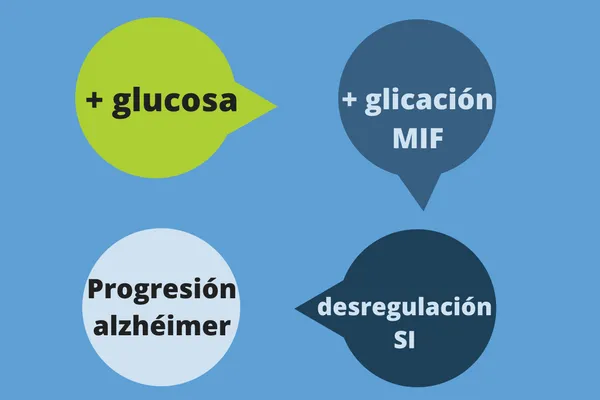A process stimulated by excess glucose and other blood sugars, leads to the inhibition of a key molecule in the immune system response to Alzheimer's disease.
On many occasions we have talked about the close relationship between diabetes and Alzheimer's.We mention that people with diabetes are almost twice as a risk of developing Alzheimer's and that even in those non -diabetic that have high blood glucose levels, the risk for the disease is greater.
What is this?Because one thing is what statistics say and another know why at the biological level it happens.The answer to that question is what generally leads to the creation of treatments.
A new study, recently published in the Scientific Reports magazine, discovered a molecular mechanism that explains, in part, why excess glucose (a type of sugar) and diabetes influence Alzheimer's disease.
The scientists, who belong to the University of Bath and the King’s College London, in the United Kingdom, analyzed samples of brain tissue of 30 people killed with Alzheimer's disease and compared them with samples of fabric from healthy people.
The samples belonged to individuals who, when they died, were in different phases of the Alzheimer's.Scientists focused their attention on the biological indicators of a process known as glycation, which has also been associated with the disease.
That the word glycation does not scare you, it is essentially a process that involves reducing glucose levels making it react with other substances of the organism, especially protein and lipids.The results of these reactions have been associated for various harmful effects, including skin aging.
The researchers found that since the early stages of Alzheimer's disease, glycation affected a protein, called MIF (macrophage migration inhibitor), which intervenes in the regulation of the immune system and also plays certain role in diabetes.
You may also be interested in reading: A nut rotation Does Alzheimer's disease predispose to type II diabetes?
The deregulation of the activity of the immune system in Alzheimer's disease is one of the fundamental alterations that characterize this evil.According to researchers, MIF glycation and the inhibition of their activity, it is a key point in the progression of Alzheimer's.In the opinion of one of the authors of the study, Professor Jean Van Den Elsen:
Normally, MIF would be part of the immune response to the accumulation of abnormal proteins in the brain, and we think that, that damaged sugar reduces some MIF functions and completely inhibits others, this could be a turning point that allows Alzheimer'sdevelop.
The scientists found that the more advanced the Alzheimer's phase was in which the person was, minors were the levels of non -gyted and older MIF those of the glyd protein.
Opportunity for the creation of therapies.
After hearing the results of this study, the British organization Alzheimer’s Society issued a statement in which Dr. Clare Walton, her investigation manager.According to Walton:
With increasing diabetes, a better understanding of how it affects brain cells can help us find ways to help people with diabetes control their risk of dementia.Alzheimer’s Society is currently financing a clinical trial to see if a diabetes drug can be used as a dementia treatment.
There have been several attempts to use drugs used in diabetes therapy as a treatment of Alzheimer's disease.Even someModesty investigations have found the benefit of the use of intranasal insulin, although so far no result has been conclusive.


